Over 30 years of anarchist writing from Ireland listed under hundreds of topics
Black Flag of Anarchism flies over Free Derry - John McGuffin & a history of Free Derry Corner
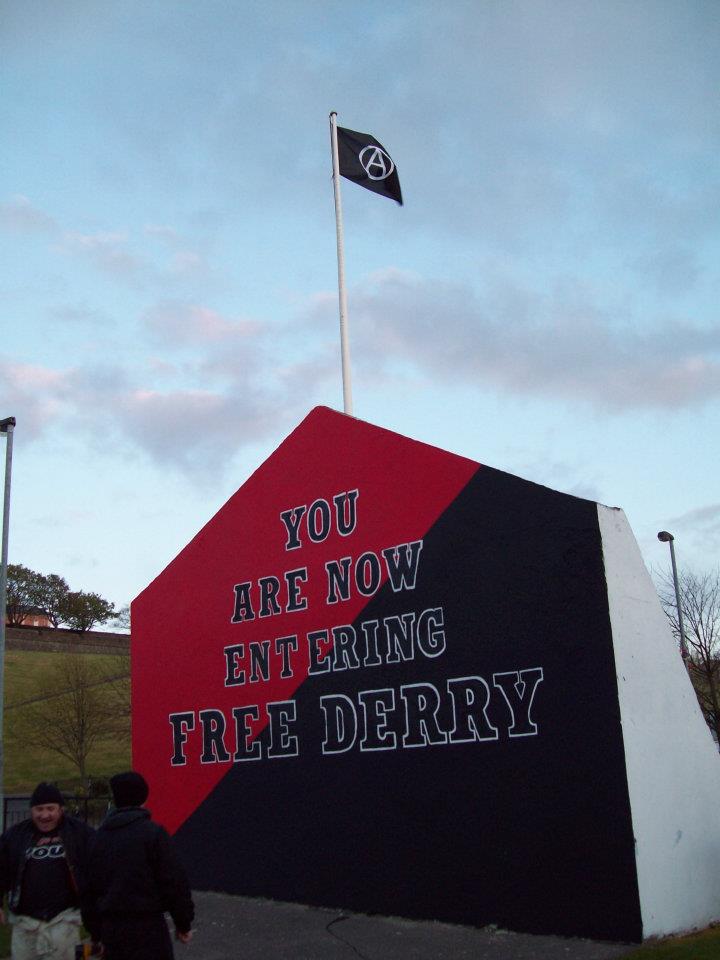
On the 10th anniversary of the death of former Civil Rights activist and Anarchist John McGuffin, local activists including former friends and comrades gathered in Derry’s Bogside and gave the iconic monument a fitting rebellious make-over with the red and black colours of anarchism. Over the next fortnight the black flag of anarchy will fly over Free Derry corner in a fine tribute. No Gods No Masters!
On a gable wall at the end of a row of dilapidated terrace houses in Derry’s Bogside back in January 5th 1969, a local youth scrawled the words ‘YOU ARE NOW ENTERING FREE DERRY’ in the dead of night. To this day there is still a dispute as to who the shadowy youth had been with several names being banded about. However the slogan itself was said to have been taken from a free-speech campaign which was active in Berkeley University in California during the mid-sixties with 'You Are Now Entering Free Berkeley' on some of its propaganda.
During that time student activists in Ireland, like the rest of Europe mirrored the actions developing in the Civil Rights movement of the North America. The day before in the outskirts of the city the Peoples Democracy (a radical leftish offshoot from the civil rights movement) march from Belfast had reached Derry after its participants were viciously attacked by loyalist mobs and off-duty B Specials.
The period that followed was amongst one of the most turbulent in the history of the north, as the British Army had been deployed, removing barricades signalling an end to what became known as Free Derry.
Over the decades the wall itself, just as the words adorning it became a symbol of hope and resistance. From the days of the early Civil Rights demonstrations to Bloody Sunday and Operation Motorman, the location of Free Derry Corner had always been a gathering point for locals in good times and in bad as a place for discussion and debate. Soapbox street politics on the issues of the day, be it from the lack housing or jobs but more importantly were calls were made to organise against those in power.
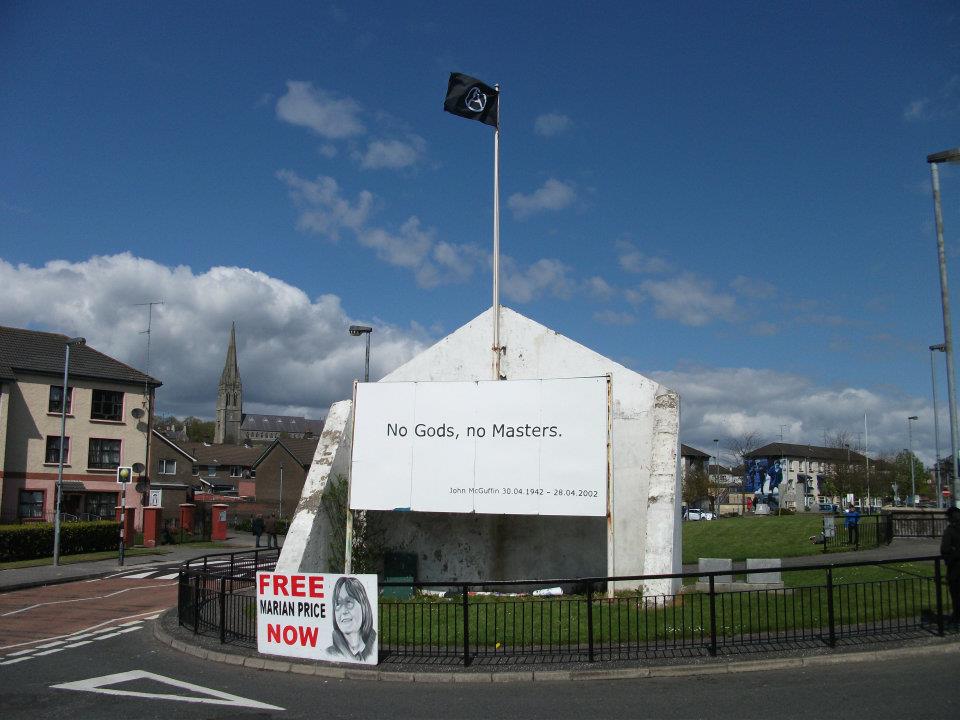
Not surprising then that Free Derry Corner was the location chosen to pay homage to one of that era’s most legendary figures, John McGuffin. On the 10th anniversary of the death of former Civil Rights activist and Anarchist, local activists including former friends and comrades gathered in Derry’s Bogside and gave the iconic monument a fitting rebellious make-over with the red and black colours of anarchism. Over the next fortnight the black flag of anarchy will fly over Free Derry corner in a tribute to John McGuffin.
The ‘Wee Black Booke of Belfast anarchism (1867-1973)’ has a brief introduction to the life and times of John McGuffin including a personal analysis of his participation in the civil rights movement to his internment and involvement in the republican movement. Here are some excerpts:
John McGuffin (1942-2002)
'There is an amusing and completely unbelievable story related at the time of John McGuffin’s funeral of his hosting the well-known American‘Yippie’ Jerry Rubin when he visited the north in the late 1960s. Passing through County Down on their way to Dublin through districts swathed in the Down Gaelic football colours of red and black, McGuffin informed his guest of how the whole area was in the grip of anarchist militants. Roadside signs emblazoned with ‘UP DOWN’ further convinced Rubin of the inspired libertarian revolutionary ethic sweeping south-east Ulster.
It was, of course, a time of great social and political ferment and this may have made McGuffin’s legendary sophistry all the more believable. Like Rubin, McGuffin was a veteran of that ferment and an anarchist of a very particular colour. Throughout his life, he made no secret of his qualified support for Irish republicanism and centred his politics around issues relative to the state and its powers. […]
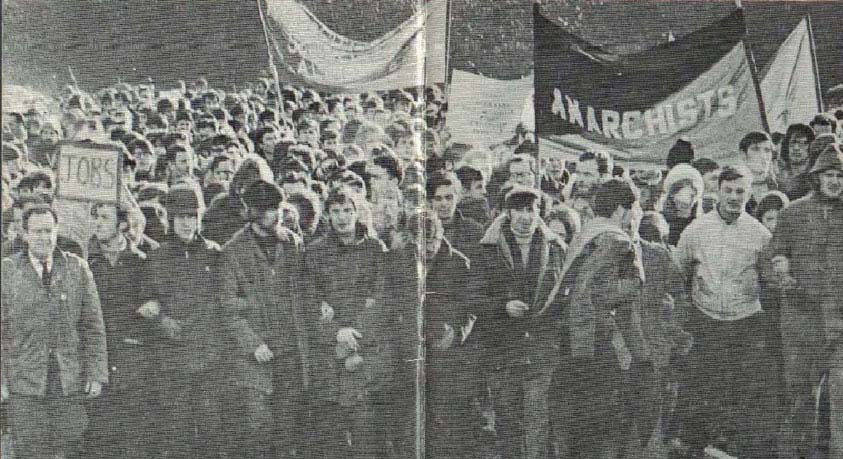
John McGuffin was born into a relatively wealthy middle class Presbyterian family in 1942. His uncle was the MP for Shankill ward from 1917 to 1921 and then for north Belfast, the Freemason and first speaker of the Stormont Parliament, Sam McGuffin, a ‘Labour Unionist’. He was sent to the exclusive Campbell College in Belfast and proceeded from there to Queen’s University where he received honours in history and psychology and then took up a lecturer’s post at Belfast Technical College. […]
It was within the confines of Queen’s University that McGuffin first came to prominence as one of the leading militants of People’s Democracy (PD), which emerged from among the student body after a frustrated civil rights march and short sit-down protest in Linenhall Street on 9 October 1969. He had already been chairman of the Queen’s Campaign for Nuclear Disarmament (CND) from 1964-65 and a member of the University Labour Group before joining PD. The group contained a significant number of very articulate, and in some senses, very naïve radical students from broadly Trotskyist, Left Republican and Anarchist backgrounds, but from the outset was a markedly non-sectarian, internationalist and libertarian civil rights movement.
It was open to all and had no written constitution, its main aims being:
(1) One man, one vote;
(2) Fair (electoral) boundaries;
(3) Houses on need;
(4) Jobs on merit;
(5) Free speech; and
(6) Repeal of the Special Powers Act.
Although the body later became a more rigid organisation with a Trotskyist programme, libertarians and anarchists, such as McGuffin, argued strongly for the open and accountable democratic principles on which the group was formed, and which had attracted him to it initially, to be maintained.
This, however, suffered its first major blow after just a few months when an earlier, albeit conservative, majority decision was taken to cancel the planned ‘long march’ from Belfast to Derry but was subsequently overturned by a minority of Young Socialists, including Michael Farrell and Cyril Toman. They held a meeting at Queen’s after most of the students had left for holidays in December 1968, unsatisfied with Prime Minister Terence O’Neill’s assurances of addressing the grievances of the civil rights movement, and vowing to carry on with the march where PD had failed. McGuffin did not agree with this tactic of usurping the broad democratic will of the students and PD, although he decided in the end to take part while still arguing his politics.
It was during the ‘long march’ and savage attack on the demonstrators at Burntollet by police and Paisleyites, that McGuffin was written into history for having an anarchist banner on the march. Much mileage has been made out of the story that McGuffin allegedly carried the banner on his own at times throughout the march, though it is something confirmed only in some memoirs of the events and finds no verification in the major studies of the protest and period. What actually happened, according to a Belfast Anarchist Group member, was that McGuffin phoned him to bring the banner for the last stage of the march into Derry, and after the Burntollet ambush, these members joined with McGuffin and marched with the banner into Derry. However, at Irish Street in the Waterside the march was attacked by another group of Paisleyites. A Belfast Anarchist veteran takes up the story, ‘I remember sticking my pole into the face of one attacker before I was punched and kicked and the banner snatched away. The attackers must have had lighter fuel with them for only a few moments later I looked back to see the banner well alight’. […]
McGuffin’s embrace of anarchism began in 1967 and he, with Robin Dunwoody and others, was a founder member of the Belfast Anarchist Group (BAG). However, McGuffin was not present for the Group’s first meeting on 5 October 1968. He had gone off to Derry in company with a 40-strong group of Young Socialists from Belfast for the ill-fated civil rights march in Duke Street, which had been banned and was brutally beaten and broken up by the RUC, and therefore missed the initial meeting in a candlelit room above a restaurant in Upper Arthur Street. At these early meetings, a member named Roland Carter brought along anarchist books and pamphlets possibly supplied from Freedom Press in London.
The difficulty, however, was that events were moving faster than could be anticipated and ‘the need for new members to have space to grow into a proper understanding of anarchism was pushed into the background by the need to respond to the rapidly-developing situation on the ground’. Nevertheless, the BAG, with some 20 or so members had displayed some good early successes. […]
By March 1969, McGuffin was in Manchester as a speaker to the Revolutionary Socialist Students Federation (RSSF), fresh from the Burntollet march and seems also to have appraised anarchists in England of circumstances in the north and events to come. He was a principal organiser for the next major PD march from Belfast to Dublin in April 1969, which was attended by many English socialists and some 40 anarchists. Numerous anarchist flags were carried on the march and some women members of the BAG made a number of anarchist neck-scarves, ‘a typically sexist job allocation’, as one BAG member recalled. This splash of anarchist colour, however, even led some journalists to label it an anarchist march. The march was plagued by difficulties from the start, beginning with a violent confrontation in Lurgan (where it actually set off from after problems in Belfast), and ending with divisions between PD and some of the southern left- wingers.
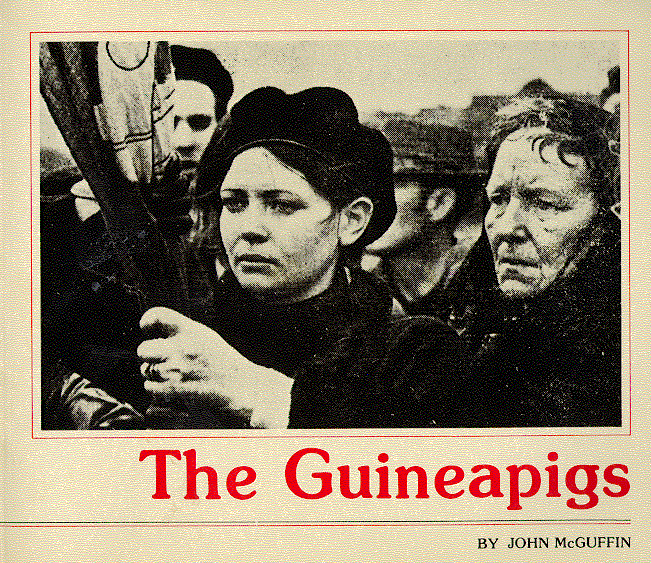
It was within PD, however, that McGuffin maintained what he called ‘an anarchist wing’ with his two closest comrades, Robin Dunwoody and Jackie Crawford, a former student of McGuffin’s at Belfast Tech who was also interned briefly. However, at a time when PD’s Free Citizen newspaper became the more pointed, perhaps more cynical, Unfree Citizen and expressed an increasing level of equivocation over IRA atrocities such as on ‘Bloody Friday’ in Belfast on 21 July 1972 when 9 people were killed and 130 injured in a city centre bombing spree, McGuffin was among the few (possibly the only PD member) to speak out publicly. He wrote in Internment, ‘Twenty-two bombs in the heart of a crowded city in broad daylight are bound to kill people no matter what warnings are given, and the Provisional IRA must bear the full responsibilities for these murders’. […]
After his internment, John McGuffin appears to have concentrated on writing for a time and it was in this area perhaps that he really excelled. His exposes of internment without trial and state-sponsored torture and systematic human rights abuses catalogued expertly and with great wit in Internment (1973) and The Guinea Pigs (1874) have stood the test of time. They are classic anti-state critiques written clearly from an unabashed libertarian perspective, and are among the very best books written about the north in the last thirty to thirty-five years.
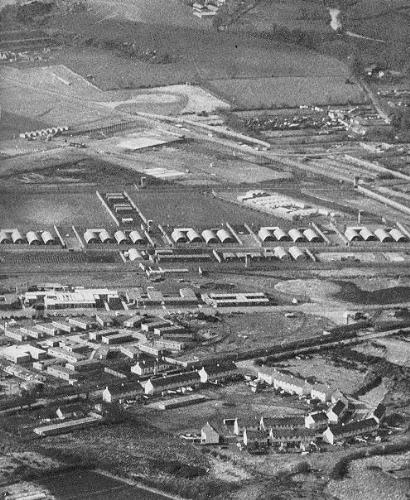
He also sat on an international committee investigating the deaths in custody of Red Army Faction members in Germany, and strengthened a long-standing friendship with various left-leaning German radicals, communists and sympathisers of Irish republicanism, while taking time out in 1978 to write the brilliant In Praise of Poteen, celebrating the ingenuity, talent and anti-authoritarian spirit of the poteen-makers as well as their historic concoctions. McGuffin’s later travails saw him re-locate to San Francisco where he became a criminal defence and human rights lawyer, before returning with his German partner and comrade, Christiane, to settle in Derry in 1998.
McGuffin’s political associations and activity then centred around his internet-based‘Dispatches’, reporting and critiquing various political developments in the north and far beyond it. He was a supporter of the Garvaghy Road Residents in their campaign against Orange marches and travelled to Portadown to take part in protests there during the marching season. He also supported the calls of the Foyle Ethical Investments Campaign (FEIC) for the removal of defence industry giant, Raytheon, from Derry, and found time to write for the Derry News mainly in a satirical and at times libellous manner. He also produced another two valuable books, one a largely autobiographical collection of apocryphal tales and the other a biography, with Joe Mulheron, of the Derry IRA man, seafarer and general adventurer, Captain Charles ‘Nomad’ McGuinness. In all, McGuffin produced nine books, a number of which were solely in German, he finding few publishers in Britain or Ireland willing to print the works of a man described by many as ‘an intellectual hooligan.’
Written by a Derry WSM member.
To check out Derry Anarchists online go to: www.derryanarchists.blogspot.com. Or alternatively facebook for more photos and up-to-date info.
Bernadette: One women's journey from mass protest to hunger strikes to the peace process http://www.wsm.ie/c/bernadette-devlin-review-notes-political-journey

